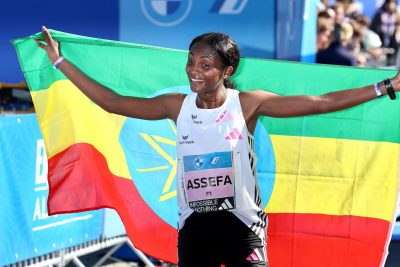Tigst Assefa Obliterates Women’s Marathon World Record with 2:11:53 in Berlin
By Jonathan GaultSeptember 24, 2023, will go down as the day women’s marathoning reached an entirely new level.
On a perfect day for running in the German capital, Ethiopia’s Tigst Assefa ran 2:11:53 to win the 2023 BMW Berlin Marathon and take more than two minutes off Brigid Kosgei‘s 2:14:04 world record. Assefa, who won last year’s race in 2:15:37 — itself one of the most shocking results in marathon history — is the first woman to break 2:12 in a marathon. And 2:13. And 2:14. Her run on Sunday was, quite simply, one of the finest in the history of the sport. *Top 30 Results
Two decades ago, Paula Radcliffe took more than three minutes off the world record over two races, taking it from 2:18:47 to 2:17:18 in Chicago in 2002, then down to 2:15:25 in London the following spring. Radcliffe’s time remained untouchable for 16 years until the introduction of supershoes, when Kosgei took a hatchet to it in Chicago in 2019. Kosgei’s run ushered in a seismic shift in women’s marathoning, with the 2022 fall marathon season producing three of the five fastest times ever — Ruth Chepngetich‘s 2:14:18 in Chicago, Amane Beriso‘s 2:14:58 in Valencia, and Assefa’s 2:15:37 in Berlin. The world record seemed destined to fall in 2023. But not by this much.
Radcliffe’s 2:15:25 and Kosgei’s 2:14:04 were both massive breakthroughs, yet Assefa’s improvement on the existing world record trumps both of them. What did we see today in Berlin? A generational talent? Another technological breakthrough (Assefa wore the newly-released $500 adidas ADIZERO Adios Pro Evo 1 shoes)? How to explain someone taking two minutes and 11 seconds off a world record in the year 2023?
The numbers are hard to comprehend. Assefa ran her first half in Berlin in 66:20 — more than a minute ahead of world record pace — and picked it up over the second half. She ran her second 13.1 miles in 65:33, which would have stood as the world record in the women’s half marathon as recently as a decade ago. It used to be significant when a woman dropped a 5:01 mile in the middle of a marathon. Assefa averaged 5:01/mile pace for the full 26.2-mile distance.
All of this from a woman who began her career as a middle-distance runner. Assefa, represented Ethiopia in the 800 meters at the 2016 Olympics (her pb: 1:59.24) before an Achilles injury forced her to move to the roads in 2018. She did not race at all in 2020 or 2021 — her manager, Gianni Demadonna, said training in Ethiopia proved difficult during the pandemic and Assefa was unable to get into any top races, which limited their professional field sizes due to COVID. When she did return, out of shape, in March 2022, she ran just 2:34:01 in her debut marathon in Riyadh. Now, 18 months later, she is the world record holder.
(Note: Assefa has been listed as both “Tigist” and “Tigst” in official results. Her agent Gianni Demadonna told LetsRun that Tigst is correct, and that she was born in 1996 — not 1994, as had been previously reported in athletics databases.)
Assefa, 26, is the first Ethiopian woman to hold the world record and trains in her home country under one of its top coaches, Gemedu Dedefo. He knew last year when she began breaking records on the courses his group uses for practice that she was something special. After her run in Berlin last year, Dedefo believed Assefa would eventually break the world record if she stayed healthy. She did not run a spring marathon this year — she withdrew from London due to injury — but on Sunday, she turned Dedefo’s belief into reality.
“I coach a lot of ladies,” said Dedefo, who also coaches Valencia winner Beriso. “Never I coach an athlete like her. Tigst is the strongest one.”
For more on Assefa’s breakthrough, read our story on her from 2022: LRC The Story Behind The MOST SHOCKING 2:15 Marathon In History
***
The Race
If there was to be a world record in Berlin this year, most believed it would come in the men’s race. Eliud Kipchoge, who set the world record in Berlin in 2022, was returning to defend his title and went through halfway on record pace in 60:22. Kipchoge’s record chances would fizzle over the second half, however, though he would hang on to win in 2:02:42.
But while much of the focus was on Kipchoge’s exploits up front, an even crazier story was playing out a few kilometers behind him. Assefa ran her first 10 kilometers in 31:45 (2:13:58 pace) — and had 12 other women right with her on world record pace. Assefa would only pick it up from there, splitting 15:41 third 5k to shake everyone save countrywoman Worknesh Edesa, who would last another mile before falling off.
The halfway splits were unlike any before seen in a women’s marathon. Six women came through on world record pace under 67:00, with a total of 11 under 68:00. Ten of those 11 would run significant positive splits. One — Assefa — would run a huge negative split, going 15:48-15:32-15:29-15:32 from 20k through 40k.
While Assefa was in a class of her own in the women’s race, she had company throughout, with male pacer Girmay Birhanu Gebru ushering her along for almost the entire distance. She also picked up some unexpected assistance from American Jared Ward — 6th in the men’s race at the 2016 Olympics — who was caught by Assefa at 28 kilometers and ran with her until the final mile, where he ran ahead to finish in 2:11:44. That was Ward’s fastest marathon time in four years — and only good enough to beat Assefa by nine seconds.
“I kept checking my watch as I could hear her getting closer, and then her lead vehicle [was] coming up on my side,” Ward wrote in a text message to LetsRun.com. “I couldn’t believe that she was on 2:12 pace! I first had a thought to stay out of her way, and then I wondered if I could help. She looks so smooth. And then, the last 5k, she certainly helped me!”
Kenya’s Sheila Chepkirui was the best of the rest in second, holding on to run 2:17:49, a time that would have won every Berlin Marathon before last year’s. But the age of 2:17 being fast enough to win a rabbitted world-class marathon is drawing quickly to a close. Chepkirui ran 2:17:29 in her debut in Valencia last year and lost by more than two minutes. Today, she was nearly six minutes behind Assefa. We live in a 2:11 world now.
Quick Take: Assefa seemed crazy for going out in 66:20…turns out, it may not have been fast enough
66:20 is an insanely fast half marathon split, but it’s not unprecedented for a women’s marathon. It’s just that usually, if you run that fast, you’re going to have a very rough second half. Last year, Ruth Chepngetich went out in 65:44 in Chicago and did what most women do when they go out that fast — she slowed way down, running her second half in 68:34.
Assefa went out slower than Chepngetich, but she still went out way faster than world record pace and somehow picked it up over the second half. Here are her complete 5k splits:
5k: 15:59
10k: 15:46 (31:45)
15k: 15:41 (47:26)
20k: 15:26 (1:02:52)
25k: 15:48 (1:18:40)
30k: 15:32 (1:34:12)
35k: 15:29 (1:49:41)
40k: 15:32 (2:05:13)
Assefa ran her final 2.195k in 6:40 (15:11 pace or 4:53/mile pace).
Quick Take: How did we get here so quickly?
The idea of a woman eventually running in the 2:11s for a marathon isn’t totally crazy. It just didn’t seem likely to happen in 2023. Last year, when Letesenbet Gidey made her marathon debut in Valencia, we wrote that based on her pbs at other distances, Gidey might be able to run 2:12 or 2:13 on a great day. Gidey has run 62:52 in the half marathon, and there are a number of men with pbs in the 62:00s who have also run a 2:11 marathon. Heck, Gidey’s coach thought she could one day run sub-2:10.
But Gidey is also a freak talent who twice won the U20 race at World XC and set world records at 5,000 and 10,000 meters on the track. She is the sort of athlete whom we could have envisioned toppling the 2:12 barrier. Not Tigst Assefa, who was a decidedly unremarkable pro until her big marathon breakthrough in Berlin last year. So how did Assefa become the first woman in the sub-2:12 club (as well as the sub-2:13 and sub-2:14 clubs)? There are a few possible explanations — or perhaps a combination of all of them:
- Assefa is a generational talent who took a while to find her event. Assefa was an 800 runner through 2016 but her track career was derailed by an Achilles problem in 2017, which forced her to the roads. It took her a few years to emerge — her training was interrupted by COVID in 2020-21, when it was difficult for her to find transport to the forests outside of Addis Ababa where Ethiopian pros train — but it may be that Assefa has always been a huge talent who was either in the wrong event or unable to properly train.
- Shoe technology just took another leap. Assefa raced Berlin in the Adizero Adios Pro Evo 1 (note to adidas: maybe pick a shorter name), a new shoe just released by adidas this month. The key stat about the Pro Evo 1 is that it weighs just 138 grams — 40% lighter than any of adidas’ other super shoes. We need more data to say anything definitively, but the last five years have shown just how powerful shoe technology can be.
- Performance-enhancing drugs. Any time a record is beaten by this much, it has to be considered — even though we must state for the record that Assefa has never tested positive, never been sanctioned, and never been linked to PEDs. Unless Assefa is using some new superdrug, it’s hard to explain a run like this with PEDs alone. We’re not aware of any drug that can make you more than two minutes faster than anyone else in history.
Quick Take: Ethiopia gets its first women’s world record — and Assefa is now faster than Abebe Bikila
Three Ethiopian men have held the marathon world record, and Ethiopian women are well-represented on the all-time list, with half of the top eight performers. But before today, no Ethiopian woman had broken the marathon world record. Assefa is the first — and, incredibly, she has run faster than the greatest Ethiopian marathoner of them all.
Abebe Bikila, who won the 1960 and 1964 Olympic titles, is an icon in Ethiopia and a hero to many of the country’s runners. Bikila set two world records — 2:15:16 to win the 1960 Olympics in Rome (in bare feet) and 2:12:11 to win the 1964 Olympics in Tokyo (with shoes). The latter broke the previous WR by nearly two minutes and would stand as Bikila’s lifetime best. Fifty-nine years later, an Ethiopian woman has run faster than Bikila’s fastest time.
Talk about the 2023 Berlin Marathon on the world-famous LetsRun.com messageboard.
- Official 2023 Berlin Marathon Live Discussion Thread – 3:15 am ET (9:15 am in Berlin)
- American men bombed, are we not going to send 3 to the Olympics?
- QUEEN ASSEFA 2:11:53 WR
- 2:11:53 – not possible w/o drugs, supershoes?
- Man I feel for Scott Fauble, DNF before 30k
- Jared Ward battling back, he may beat Assefa
- Kipchoge needs to just focus on 3 peating at Olympics
- I don’t think Kipchoge runs faster than 204-205
- Tadese Takele, 21 years old future marathon crack











